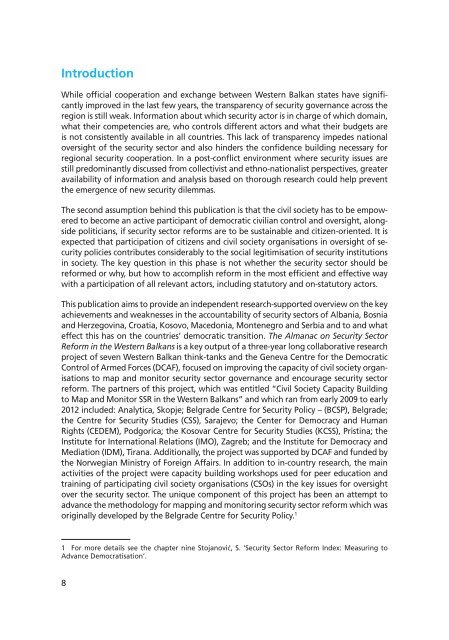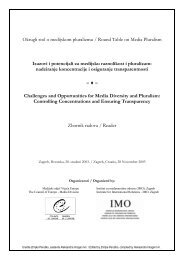almanac on security sector oversight in the Western Balkans
almanac on security sector oversight in the Western Balkans
almanac on security sector oversight in the Western Balkans
You also want an ePaper? Increase the reach of your titles
YUMPU automatically turns print PDFs into web optimized ePapers that Google loves.
Introducti<strong>on</strong><br />
While official cooperati<strong>on</strong> and exchange between <strong>Western</strong> Balkan states have significantly<br />
improved <strong>in</strong> <strong>the</strong> last few years, <strong>the</strong> transparency of <strong>security</strong> governance across <strong>the</strong><br />
regi<strong>on</strong> is still weak. Informati<strong>on</strong> about which <strong>security</strong> actor is <strong>in</strong> charge of which doma<strong>in</strong>,<br />
what <strong>the</strong>ir competencies are, who c<strong>on</strong>trols different actors and what <strong>the</strong>ir budgets are<br />
is not c<strong>on</strong>sistently available <strong>in</strong> all countries. This lack of transparency impedes nati<strong>on</strong>al<br />
<strong>oversight</strong> of <strong>the</strong> <strong>security</strong> <strong>sector</strong> and also h<strong>in</strong>ders <strong>the</strong> c<strong>on</strong>fidence build<strong>in</strong>g necessary for<br />
regi<strong>on</strong>al <strong>security</strong> cooperati<strong>on</strong>. In a post-c<strong>on</strong>flict envir<strong>on</strong>ment where <strong>security</strong> issues are<br />
still predom<strong>in</strong>antly discussed from collectivist and ethno-nati<strong>on</strong>alist perspectives, greater<br />
availability of <strong>in</strong>formati<strong>on</strong> and analysis based <strong>on</strong> thorough research could help prevent<br />
<strong>the</strong> emergence of new <strong>security</strong> dilemmas.<br />
The sec<strong>on</strong>d assumpti<strong>on</strong> beh<strong>in</strong>d this publicati<strong>on</strong> is that <strong>the</strong> civil society has to be empowered<br />
to become an active participant of democratic civilian c<strong>on</strong>trol and <strong>oversight</strong>, al<strong>on</strong>gside<br />
politicians, if <strong>security</strong> <strong>sector</strong> reforms are to be susta<strong>in</strong>able and citizen-oriented. It is<br />
expected that participati<strong>on</strong> of citizens and civil society organisati<strong>on</strong>s <strong>in</strong> <strong>oversight</strong> of <strong>security</strong><br />
policies c<strong>on</strong>tributes c<strong>on</strong>siderably to <strong>the</strong> social legitimisati<strong>on</strong> of <strong>security</strong> <strong>in</strong>stituti<strong>on</strong>s<br />
<strong>in</strong> society. The key questi<strong>on</strong> <strong>in</strong> this phase is not whe<strong>the</strong>r <strong>the</strong> <strong>security</strong> <strong>sector</strong> should be<br />
reformed or why, but how to accomplish reform <strong>in</strong> <strong>the</strong> most efficient and effective way<br />
with a participati<strong>on</strong> of all relevant actors, <strong>in</strong>clud<strong>in</strong>g statutory and <strong>on</strong>-statutory actors.<br />
This publicati<strong>on</strong> aims to provide an <strong>in</strong>dependent research-supported overview <strong>on</strong> <strong>the</strong> key<br />
achievements and weaknesses <strong>in</strong> <strong>the</strong> accountability of <strong>security</strong> <strong>sector</strong>s of Albania, Bosnia<br />
and Herzegov<strong>in</strong>a, Croatia, Kosovo, Maced<strong>on</strong>ia, M<strong>on</strong>tenegro and Serbia and to and what<br />
effect this has <strong>on</strong> <strong>the</strong> countries’ democratic transiti<strong>on</strong>. The Almanac <strong>on</strong> Security Sector<br />
Reform <strong>in</strong> <strong>the</strong> <strong>Western</strong> <strong>Balkans</strong> is a key output of a three-year l<strong>on</strong>g collaborative research<br />
project of seven <strong>Western</strong> Balkan th<strong>in</strong>k-tanks and <strong>the</strong> Geneva Centre for <strong>the</strong> Democratic<br />
C<strong>on</strong>trol of Armed Forces (DCAF), focused <strong>on</strong> improv<strong>in</strong>g <strong>the</strong> capacity of civil society organisati<strong>on</strong>s<br />
to map and m<strong>on</strong>itor <strong>security</strong> <strong>sector</strong> governance and encourage <strong>security</strong> <strong>sector</strong><br />
reform. The partners of this project, which was entitled “Civil Society Capacity Build<strong>in</strong>g<br />
to Map and M<strong>on</strong>itor SSR <strong>in</strong> <strong>the</strong> <strong>Western</strong> <strong>Balkans</strong>” and which ran from early 2009 to early<br />
2012 <strong>in</strong>cluded: Analytica, Skopje; Belgrade Centre for Security Policy – (BCSP), Belgrade;<br />
<strong>the</strong> Centre for Security Studies (CSS), Sarajevo; <strong>the</strong> Center for Democracy and Human<br />
Rights (CEDEM), Podgorica; <strong>the</strong> Kosovar Centre for Security Studies (KCSS), Prist<strong>in</strong>a; <strong>the</strong><br />
Institute for Internati<strong>on</strong>al Relati<strong>on</strong>s (IMO), Zagreb; and <strong>the</strong> Institute for Democracy and<br />
Mediati<strong>on</strong> (IDM), Tirana. Additi<strong>on</strong>ally, <strong>the</strong> project was supported by DCAF and funded by<br />
<strong>the</strong> Norwegian M<strong>in</strong>istry of Foreign Affairs. In additi<strong>on</strong> to <strong>in</strong>-country research, <strong>the</strong> ma<strong>in</strong><br />
activities of <strong>the</strong> project were capacity build<strong>in</strong>g workshops used for peer educati<strong>on</strong> and<br />
tra<strong>in</strong><strong>in</strong>g of participat<strong>in</strong>g civil society organisati<strong>on</strong>s (CSOs) <strong>in</strong> <strong>the</strong> key issues for <strong>oversight</strong><br />
over <strong>the</strong> <strong>security</strong> <strong>sector</strong>. The unique comp<strong>on</strong>ent of this project has been an attempt to<br />
advance <strong>the</strong> methodology for mapp<strong>in</strong>g and m<strong>on</strong>itor<strong>in</strong>g <strong>security</strong> <strong>sector</strong> reform which was<br />
orig<strong>in</strong>ally developed by <strong>the</strong> Belgrade Centre for Security Policy. 1<br />
1 For more details see <strong>the</strong> chapter n<strong>in</strong>e Stojanović, S. ‘Security Sector Reform Index: Measur<strong>in</strong>g to<br />
Advance Democratisati<strong>on</strong>’.<br />
8



